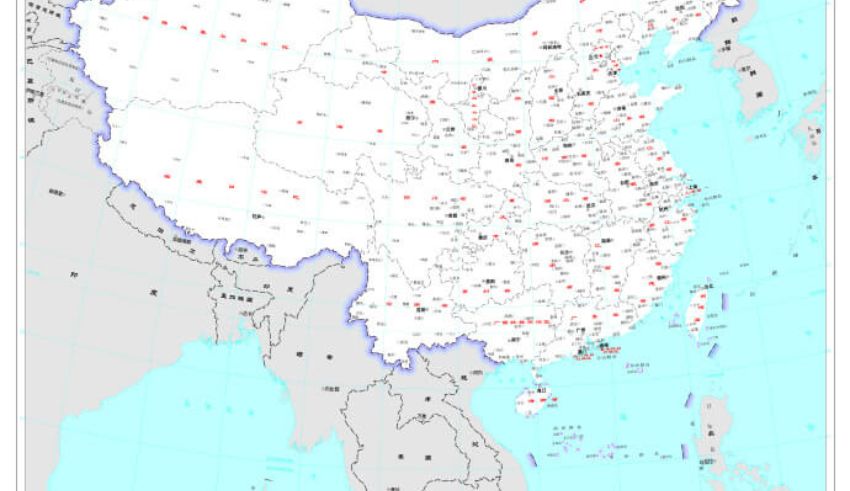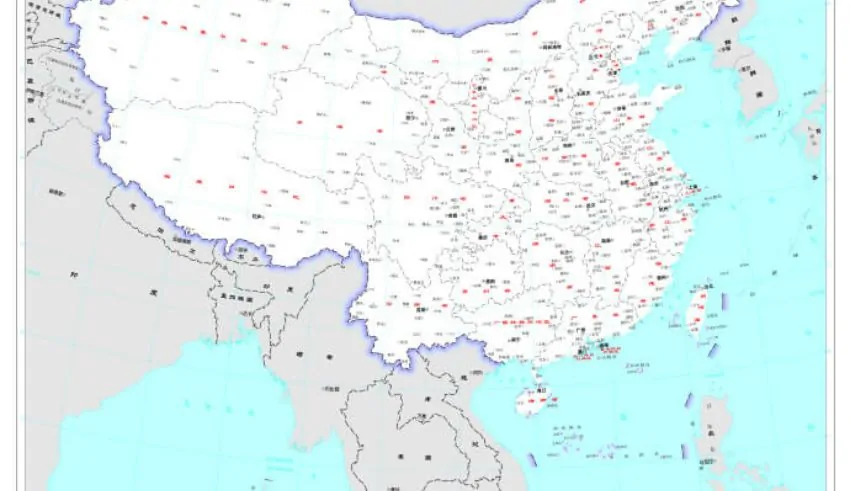

(C) The Maritime Executive
China’s release of a new national map sparked off a diplomatic tsunami over Asia, attracting condemnation over its bold territorial claims from Russia among other countries. This updated map, which shows China’s borders and territorial authority and includes Bolshoi Ussuriysky Island, a geographical mass whose ownership was once resolved between Beijing and Moscow, has significantly heightened tensions between the two countries. By deviating China’s already delicate relations with her neighbors, the measure has further convoluted the geopolitical picture of the region.
China’s claim over Bolshoi Ussuriysky Island, near the Chinese-Russian boundary at the intersection of the Amur and Ussiri Rivers, sparks much controversy regarding the new map. For decades, the sovereignty of this island was a contentious issue dividing the two nations that had multiple diplomatic disputes and even military engagements in the 20th century. But apparently closing doors, both countries struck a deal splitting the island between China and Russia, therefore resolving the war. Approved by both governments, this agreement was crucial in verifying the growing cooperation between the two great nations.
Despite this history of cooperation, China’s updated national map seems to go against the island’s current position. Outlook, an Indian publication, argues that by depicting total Chinese control over Bolshoi Ussuriysky Island, the new map basically removes Russia’s share of the territory. Long believing the matter was resolved, the Kremlin saw this provocative behavior immediately.
China’s claims have enormous consequences, but Russia’s reaction to the new map has been extremely cautious. Given its current international isolation brought on by the war in Ukraine and crushing Western sanctions, Russia has become increasingly dependent on its economic ties to China. The Kremlin thus finds itself in a difficult position: Russia’s weakened geopolitical posture makes it inappropriate to publicly threaten Beijing, even if President Vladimir Putin is presumably displeased with China’s territorial assertiveness.
Professor Mark Katz of the Schar School of Policy and Government at George Mason University spelled out the scenario Russia finds itself in. Katz claimed in a Newsweek interview that the Kremlin is well aware of the implications of official Chinese maps, particularly those claiming Russian territory. “The Kremlin quite definitely pays great attention to Chinese maps—especially official ones—claiming that Russian territory actually belongs to China,” Katz said. He noted, however, “Putin is not in a position to loudly complain about this since Moscow has become so dependent on economic relations with China as a result of Western sanctions.”
Reflecting the careful equilibrium Russia must find in its relationship with China, the Kremlin first decided not to respond publicly in the days that followed the map’s publishing. As the discussion gathered speed, Russian authorities at last made a statement addressing the issue. Underlining that the territorial dispute was formally resolved almost twenty years ago, Maria Zakharova, a Foreign Ministry spokesman for Russia, said She pointed out that in 2005 the two nations signed an additional agreement dividing Bolshoi Ussuriysky Island and establishing their official border. Zakharova argues that the line separating China and Russia was completed in 2008 and that since then, both countries have confirmed they neither have any claims for mutual territory.
“The Russian and Chinese sides adhere to the common position that the border issue between our countries has finally resolved,” Zakharova said in her comment, translated by Newsweek. She stressed once more how both governments had agreed to honor the current borders and how the agreement reached in 2005 marked the formal resolution of the conflict.
But given China’s growing worldwide influence, the release of its new map suggests Beijing may be ready to go over earlier agreements. This potential has created concerns in Moscow, where authorities already show sensitivity to China’s possible expansionist ambitions considering Russia’s current shortcomings on the global scene.
China has, for its part, been extinct in the face of Western criticism. Beijing has justified the new map as a necessary expression of its national sovereignty and a mirror of the country’s justifiable territorial claims. Reported in Newsweek, a top official from China’s Ministry of Natural Resources said, “a correct national map is a symbol of national sovereignty and territorial integrity.” Speaking for China’s Foreign Ministry, Wang Wenbin said the map was a normal exercise in conformity with international law, therefore representing China’s exercise of sovereignty.
Against excessively reading the situation, Wang advised the countries touched by the map to be “objective and calm.” He noted that China has a legal right to produce an accurate map depicting its geographical bounds and underlined that the exercise had as its goal not to cause any unnecessary conflict.
Apart from souring relations with Russia, the publishing of China’s new map has attracted heated reactions from several other countries in the area. Having long-standing disputes with China over land and maritime borders, the Philippines, Malaysia, Vietnam, Taiwan, and India have all issued comments criticizing the map’s territorial claims.
The Philippine Foreign Ministry specifically accused China of trying to support its claims over disputed territory of the South China Sea. Since its actions lacked basis under international law, the ministry advised Beijing to respect the sovereignty of its neighbors. Particularly in resource-rich regions, NBC News stated the Philippines and other Southeast Asian countries have been progressively vocal against China’s ambitions to take over oceanic territory.
India responded severely as well. Since the map showed Indian territory—including areas of Aksai Chin and the Arunachal Pradesh area—as belonging to China, its publishing rekindled disputes between New Delhi and Beijing. Based on this claim, Indian officials answered formally diplomatically. Emphasizing India’s strong opposition to China’s territorial claims, India’s Foreign Secretary Arindam Bagchi said unequivocally that “We reject these claims as they have no basis.”
The release of China’s new map conforms to a more general trend of Beijing’s mounting aggressiveness over its territorial claims. China has lately become more active in the South China Sea, establishing military sites on disputed islands and boosting its naval presence there. Notwithstanding growing resistance from the world community, the country has also become increasingly vocal in its claims to Taiwan, which it considers as part of its territory.
China’s actions are likely to increase tensions with its neighbors, many of which fear that Beijing’s territorial ambitions could lead to more conflict in the region. China’s continuous assertiveness is driving geopolitical dynamics in Asia to become more complicated as countries like Russia find themselves caught in a complex web of economic reliance and territorial disputes.
For Moscow, the situation offers a difficult challenge. Given China’s present isolation from most of the globe, Russia has to take into account the likely consequences of its growing aggressiveness even if it cannot afford to lose China as an ally. As China keeps increasing its territorial claims, Russia might have to contend with the possibility that its own sovereignty could be compromised in the future.
Early Tuesday morning. The fire, which could be seen from several miles away, caused mass evacuations as the authorities fine-tuned…
OpenAI's new image creation option on ChatGPT attracted many users in a short time. ChatGPT achieved its one million user…
Yuki Tsunoda has targeted a dream podium at his home Japanese Grand Prix following his surprise elevation to Red Bull.…
Finally, it is out! Tom Holland will return to the red and blue suit as Marvel formally launches the title…
Turkish music lovers and the whole entertainment world on Sunday night were put in shock by the unexpected passing of…
The Senior Asian Wrestling Championship 2025 held in Amman closed with an exhilarating finale for India. The freestyle wrestling contingent…
This website uses cookies.
Read More